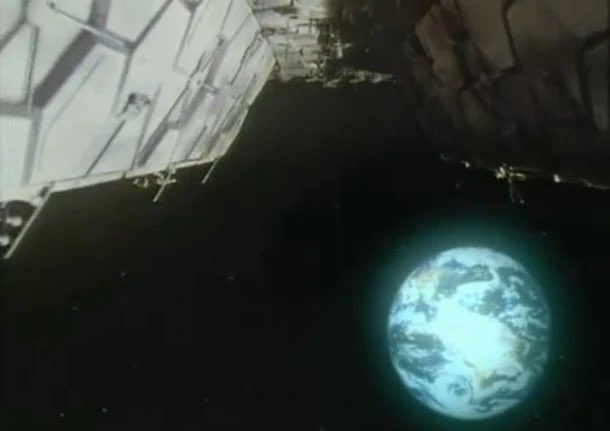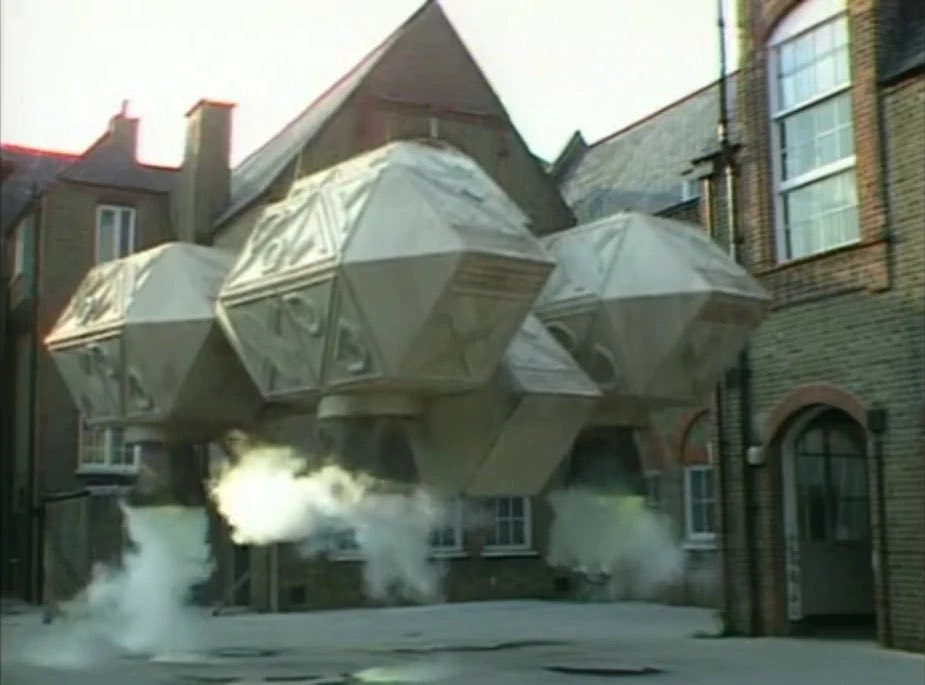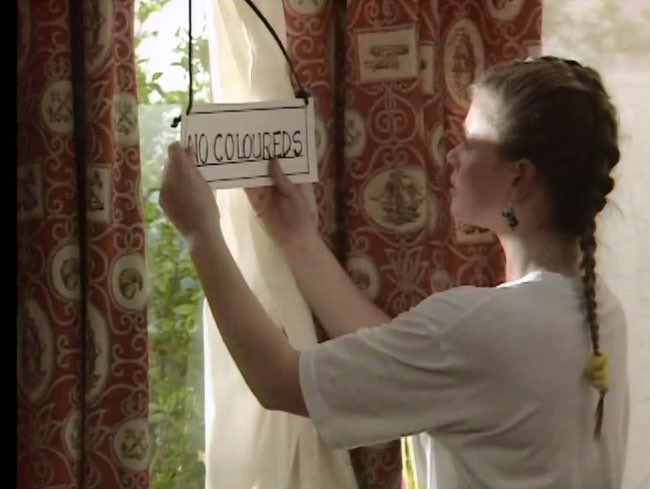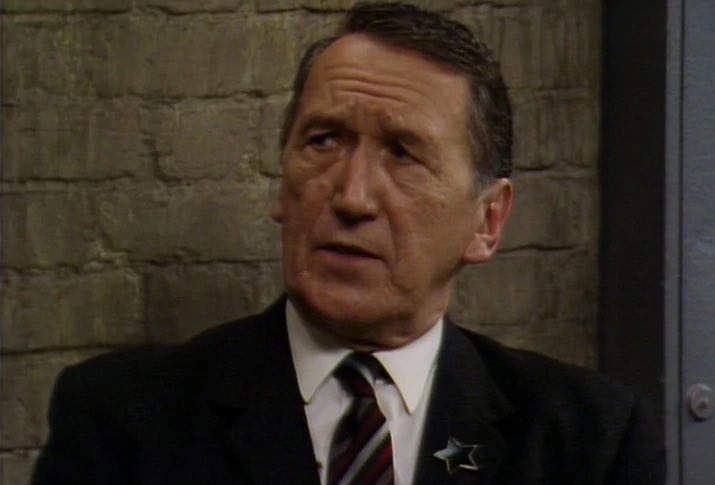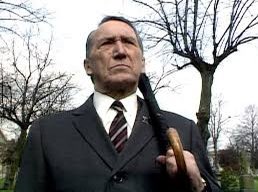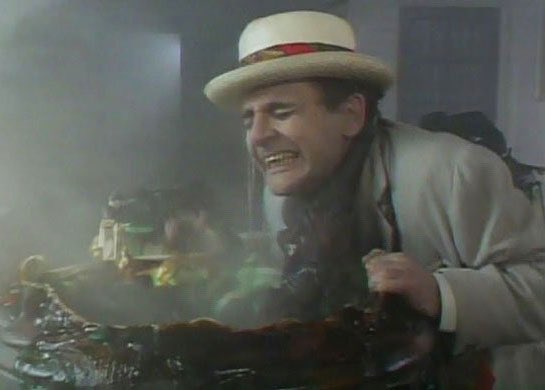#NowWatching “Remembrance of the Daleks.”
If it’s not the best Dalek story ever, it’s clearly one of them.
If it’s not the best Dalek story ever, it’s clearly one of them.
“Our most basic common link is that we all inhabit this small planet. We all breathe the same air.”
The teaser for “Remembrance of the Daleks” is striking in a number of ways, returning the show to its sixties roots for its silver anniversary, and tying those origins to Kennedy.
The teaser for “Remembrance of the Daleks” is striking in a number of ways, returning the show to its sixties roots for its silver anniversary, and tying those origins to Kennedy.
In that, in doing so, “Remembrance of the Daleks” acknowledges that “Doctor Who” is old enough to be part of its own history.
But also in tying the social tumult of the sixties to the reality of the eighties. History has an arc, even if it’s not what we anticipate.
But also in tying the social tumult of the sixties to the reality of the eighties. History has an arc, even if it’s not what we anticipate.
The intro also hinges on a greater assumption of televisual literacy than most earlier “Doctor Who.”
In that the opening teaser only really works if it assumes the audience knows that the Daleks are on the ship coming into shot like the Star Destroyer in “Star Wars.”
In that the opening teaser only really works if it assumes the audience knows that the Daleks are on the ship coming into shot like the Star Destroyer in “Star Wars.”
After all, “aliens come to Earth” isn’t a big enough hook to break the format of the show. But the Daleks are.
And the episode assumes that viewers can piece together who is on the ship from the title “Remembrance of the Daleks.”
And the episode assumes that viewers can piece together who is on the ship from the title “Remembrance of the Daleks.”
This sounds self-evident, but consider that “Doctor Who” has spent decades treating “oh no, it’s the Daleks!” as the go-to cliffhanger for the first episode of every “... of the Daleks” story.
(The show also does this a lot with the Cybermen, as the show mocks in “Dark Water.”)
(The show also does this a lot with the Cybermen, as the show mocks in “Dark Water.”)
Now, obviously, those cliffhangers are as much about building anticipation as surprising the audience, but still it’s quite tiring after the tenth go-round or so.
So it’s fun to see “Remembrance of the Daleks” open with “you know it’s the Daleks, we know it’s the Daleks.”
So it’s fun to see “Remembrance of the Daleks” open with “you know it’s the Daleks, we know it’s the Daleks.”
Indeed, the first episode of “Remembrance of the Daleks” wastes little time introducing the Daleks themselves, rather than holding it back for the cliffhanger.
Instead, the cliffhanger is a Dalek flying up stairs - showing the audience something *new* with the iconic aliens.
Instead, the cliffhanger is a Dalek flying up stairs - showing the audience something *new* with the iconic aliens.
“How can you be sure?”
“I've been here before.”
There’s something really interesting in the story’s approach to nostalgia.
“Doctor Who” had embraced fannish nostalgia around its 20th anniversary, leading to stories like “Warriors of the Deep” or “Attack of the Cybermen.”
There’s something really interesting in the story’s approach to nostalgia.
“Doctor Who” had embraced fannish nostalgia around its 20th anniversary, leading to stories like “Warriors of the Deep” or “Attack of the Cybermen.”
This sort of nostalgia was the kind you see too often in modern fan-friendly franchises, driven by references and allusions that appeal to the in-group and affirm and validate their fandom.
Often by alienating more casual audiences.
Often by alienating more casual audiences.
In contrast, “Remembrance of the Daleks” is explicitly about the Doctor delving into his own past and history in a way that is much more accessible and metatextual.
It doesn’t rely on an encyclopaedic knowledge of the show’s history to appreciate it, which is important.
It doesn’t rely on an encyclopaedic knowledge of the show’s history to appreciate it, which is important.
More than that, “Remembrance of the Daleks” exists in conversation with that history, rather than just regurgitating and repeating it.
It challenges the audience’s understanding of the Doctor himself, and puts the show’s history in proper context.
It challenges the audience’s understanding of the Doctor himself, and puts the show’s history in proper context.
“What if I could control people's tastebuds? What if I decided that no one would take sugar?”
“Remembrance of the Daleks” brings a new side of the Doctor into focus, one at odds with his previous six incarnations.
It’s a novel approach to a twenty-five year old character.
“Remembrance of the Daleks” brings a new side of the Doctor into focus, one at odds with his previous six incarnations.
It’s a novel approach to a twenty-five year old character.
Sylvester McCoy’s first season was plotted and scripted by the seat of the production team’s pants. It worked out well enough, all things considered.
But, with “Remembrance of the Daleks”, the production team brings a bold new vision of the Doctor into focus.
But, with “Remembrance of the Daleks”, the production team brings a bold new vision of the Doctor into focus.
The Doctor had previously been characterised as a reactive figure, one who responded to events after randomly stumbling into them.
The Seventh Doctor is presented as a more proactive figure, moving more decisively and more calculatedly. It’s a bold reinvention.
The Seventh Doctor is presented as a more proactive figure, moving more decisively and more calculatedly. It’s a bold reinvention.
It’s very clever to have the Doctor go back to his beginnings to signal this shift in characterisation, signalling a metaphorical rebirth for the character.
There’s even a funeral scene, to hammer home the idea that the Doctor is bidding goodbye to an older version of himself.
There’s even a funeral scene, to hammer home the idea that the Doctor is bidding goodbye to an older version of himself.
“This country fought for the wrong cause in the last war. When I spoke out, they had me imprisoned.”
“Remembrance of the Daleks” sends the Doctor crashing not only into his own history, but that history crashing into real history, pushed out of the frame of earlier stories.
“Remembrance of the Daleks” sends the Doctor crashing not only into his own history, but that history crashing into real history, pushed out of the frame of earlier stories.
“Remembrance of the Daleks” confronts the audience with the reality of life in 1963.
The casual racism that shaped society, that could only be metaphorically explored rather than literally explored.
“Remembrance of the Daleks” renders subtext as text.
The casual racism that shaped society, that could only be metaphorically explored rather than literally explored.
“Remembrance of the Daleks” renders subtext as text.
So the Daleks inevitably team up with human neo-Nazis, as if to make it very explicit what the Daleks always represented in “Doctor Who.”
Enough time has passed that the show can look back on the era as it was, and what “Doctor Who” was obliquely exploring in it.
Enough time has passed that the show can look back on the era as it was, and what “Doctor Who” was obliquely exploring in it.
Again, you get the sense of postmodernism at play in the McCoy era, where “Remembrance of the Daleks” is as much about exploring the history and the future of of “Doctor Who” as it is about having the Doctor beat the Daleks again.
In this context, it’s worth noting how much time “Remembrance of the Daleks” spends on the act of mediation.
At one point, Ace is about to watch “An Unearthly Child” on the BBC. At another, she listens to Daleks through a radio. Davros even screams through the telly.
At one point, Ace is about to watch “An Unearthly Child” on the BBC. At another, she listens to Daleks through a radio. Davros even screams through the telly.
“What was that?”
“They've mutated again.”
Again, it’s notable that “Remembrance of the Daleks” also mutates the Daleks themselves as well as the Doctor.
The Daleks have also changed, in their own weird way over the twenty-five years since they first appeared.
Again, it’s notable that “Remembrance of the Daleks” also mutates the Daleks themselves as well as the Doctor.
The Daleks have also changed, in their own weird way over the twenty-five years since they first appeared.
Indeed, it’s notable that “Remembrance of the Daleks” brings the Daleks back to the roots of “Doctor Who.”
The pepperpots were famously introduced in the show’s second story, even though they immediately became foundational to “Doctor Who.”
The pepperpots were famously introduced in the show’s second story, even though they immediately became foundational to “Doctor Who.”
“Remembrance of the Daleks” suggests that the Daleks were lurking just outside the edge of the frame in “An Unearthly Child”, waiting to come into focus.
Again, it’s all very self-aware and metatextual, suggesting that the Daleks were *always* there.
Again, it’s all very self-aware and metatextual, suggesting that the Daleks were *always* there.
“So the Daleks grab the Hand of Omega and go, and no one gets hurt. Brilliant.”
“Just one thing.”
“What?”
“I didn't expect two Dalek factions, and now I've got to make sure the wrong ones don't get their grubby little protuberances on it.”
Much is made of the Seventh Doctor as a chess master figure, in contrast to his earlier incarnations.
However, it’s interesting how frequently the show has the Doctor’s and plans backfire or get tangled up.
He’s very rarely as smart as he thinks he is.
However, it’s interesting how frequently the show has the Doctor’s and plans backfire or get tangled up.
He’s very rarely as smart as he thinks he is.
There are frequently several unanticipated complications in the Seventh Doctor’s plans, which complicate his scheming.
Obviously, it’s basic plotting - there’s no tension if everything always goes to plan. However, it’s also very clever in its own right.
Obviously, it’s basic plotting - there’s no tension if everything always goes to plan. However, it’s also very clever in its own right.
In that there’s a conscious sense that this sort of Machiavellian scheming is a limit case for the characterisation of the Doctor.
It suggests that the Doctor is not inherently good at this sort of thing, even if he’s trying. Which makes for nuanced characterisation.
It suggests that the Doctor is not inherently good at this sort of thing, even if he’s trying. Which makes for nuanced characterisation.
There’s a tendency in fandom to treat the Seventh Doctor as some sort of fiendish genius, but one of the more interesting aspect of the “Cartmel Masterplan” is how often he bites off far more than he can chew.
And this results in lots of dead bodies.
And this results in lots of dead bodies.
I know that the Seventh Doctor gets an on-screen regeneration in “The Movie”, but I often wonder what a “proper” regeneration story for the Seventh Doctor might look like.
What’s his “Caves of Androzani”, “The Parting of the Ways”, “The Time of the Doctor” or “The Doctor Falls”?
What’s his “Caves of Androzani”, “The Parting of the Ways”, “The Time of the Doctor” or “The Doctor Falls”?
“I trusted you. I even liked you, and all you—“
The idea that the Doctor is fundamentally untrustworthy is mirrored in Ace’s complicated relationship with Mike Smith.
Smith is also more than he claims to be, keeping secrets and working for his own agenda.
The idea that the Doctor is fundamentally untrustworthy is mirrored in Ace’s complicated relationship with Mike Smith.
Smith is also more than he claims to be, keeping secrets and working for his own agenda.
“Remembrance of the Daleks” is really the start of the Cartmel Era proper, and it kicks off arcs that run through the next season as well.
Notably, Ace growing to question and challenge the Doctor, pushing the boundaries of the classic companion relationship.
Notably, Ace growing to question and challenge the Doctor, pushing the boundaries of the classic companion relationship.
Again, you can see a lot of the seeds of modern “Doctor Who” in this stretch, in particular the idea of companions like Donna and Clara who push back against the Doctor as an absolute narrative and moral authority.
Ace wasn’t the first companion to challenge the Doctor. Romana is sorely underrated as a key figure in the evolution of the companion.
However, Ace was really the first companion to fold that into her arc, to start as a typical companion and become something more complicated.
However, Ace was really the first companion to fold that into her arc, to start as a typical companion and become something more complicated.
“You have no superiors, no inferiors, no reinforcement, no hope, no rescue.”
“You are lying. There is insufficient data.”
“You're trapped a trillion miles and a thousand years from a disintegrated home.”
It’s amazing how much of the revival is evident in eighties “Doctor Who.”
It’s amazing how much of the revival is evident in eighties “Doctor Who.”
It’s possible to draw a clear line from the Seventh Doctor’s confrontation with the last Dalek in “Remembrance of the Daleks” to the Ninth Doctor’s confrontation with another last Dalek in... well “Dalek.”
And the creepy child controller obviously is an influence on “Bad Wolf.”
And the creepy child controller obviously is an influence on “Bad Wolf.”
And it’s also notable how much of “Vengeance on Varos” shines through in “Bad Wolf” and how the “army of Daleks out of the dead” in “The Parting of the Ways” is lifted from “Revelation of the Daleks.”
It creates a continuity that runs from the original show into the revival.
It creates a continuity that runs from the original show into the revival.
By the time “Remembrance of the Daleks” aired, there was a sense that the writing was on the wall for “Doctor Who.”
Luckily, the show was preparing for the future, even if it couldn’t have realised it.
Luckily, the show was preparing for the future, even if it couldn’t have realised it.

 Read on Twitter
Read on Twitter